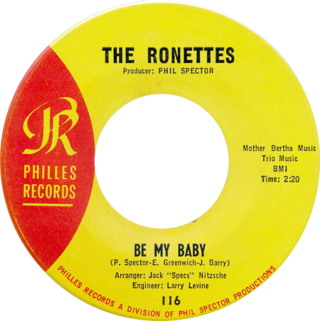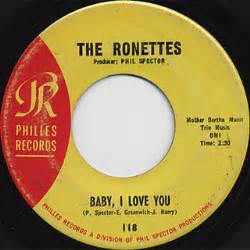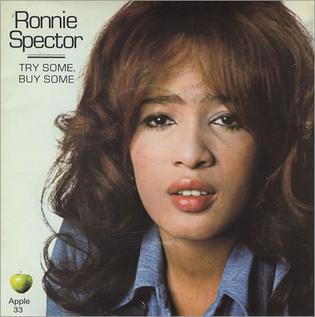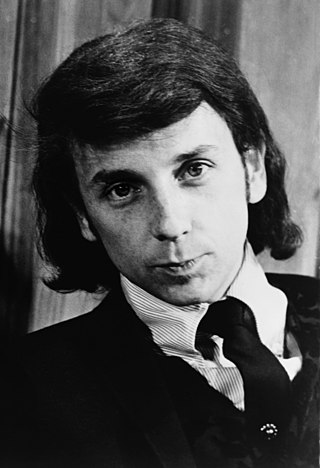
"The Long and Winding Road" is a song by the English rock band the Beatles from their 1970 album Let It Be. It was written by Paul McCartney and credited to Lennon–McCartney. When issued as a single in May 1970, a month after the Beatles' break-up, it became the group's 20th and last number-one hit on the Billboard Hot 100 chart in the United States.

"Instant Karma!" is a song by English rock musician John Lennon, released as a single on Apple Records in February 1970. The lyrics focus on a concept in which the consequences of one's actions are immediate rather than borne out over a lifetime. The single was credited to "Lennon/Ono with the Plastic Ono Band", apart from in the US, where the credit was "John Ono Lennon". The song reached the top five in the British and American charts, competing with the Beatles' "Let It Be" in the US, where it became the first solo single by a member of the band to sell a million copies.

"You've Lost That Lovin' Feelin'" is a song by Phil Spector, Barry Mann and Cynthia Weil, first recorded in 1964 by the American vocal duo the Righteous Brothers. This version, produced by Spector, is cited by some music critics as the ultimate expression and illustration of his Wall of Sound recording technique. The record was a critical and commercial success on its release, reaching number one in early February 1965 in both the United States and the United Kingdom. The single ranked No. 5 in Billboard's year-end Top 100 of 1965 Hot 100 hits – based on combined airplay and sales, and not including three charted weeks in December 1964 – and has entered the UK Top Ten on an unprecedented three occasions.

"River Deep – Mountain High" is a song by Ike & Tina Turner released on Philles Records as the title track to their 1966 studio album. Produced by Phil Spector and written by Spector, Jeff Barry and Ellie Greenwich. Rolling Stone ranked "River Deep – Mountain High" No. 33 on their list of the 500 Greatest Songs of All Time. NME ranked it No. 37 on their list of the 500 Greatest Songs of All Time. The Rock and Roll Hall of Fame added it to the list of the 500 Songs That Shaped Rock and Roll. The song was inducted into the Grammy Hall of Fame in 1999.

"Be My Baby" is a song by American girl group the Ronettes that was released as a single on Philles Records in August 1963. Written by Jeff Barry, Ellie Greenwich, and Phil Spector, the song was the Ronettes' biggest hit, reaching number 2 in the U.S. and number 4 in the UK. It is often ranked as among the best songs of the 1960s, and it is regarded by some as one of the greatest songs of all time.

"Baby, I Love You" is a song originally recorded by the Ronettes in 1963 and released on their debut album Presenting the Fabulous Ronettes (1964). The song was written by Jeff Barry, Ellie Greenwich, and Phil Spector, and produced by Spector.

"Try Some, Buy Some" is a song written by English rock musician George Harrison that was first released in April 1971 as a single by American singer Ronnie Spector, formerly the lead vocalist of the Ronettes. She recorded it in London along with other Harrison compositions for a planned comeback album on the Beatles' Apple record label. The project was co-produced by Phil Spector, Ronnie's husband at the time, but abandoned following recording sessions that were hampered by his erratic behaviour. The only official release from the sessions, the single achieved minimal commercial success, peaking at number 77 on the US Billboard Hot 100 and number 63 on Canada's RPM Top 100. Harrison later added his own vocal onto a new mix of the instrumental track and included the song on his 1973 album Living in the Material World.

"Please Let Me Wonder" is a song by the American rock band the Beach Boys from their 1965 album The Beach Boys Today!. Written by Brian Wilson and Mike Love, it was the first song Wilson wrote under the influence of marijuana. The lyrics are about a man who does not know if a girl loves him and is afraid of learning the answer, and so he prefers to fantasize that she does. On February 15, the song was issued as the B-side to their "Do You Wanna Dance?" single before the album's release.

"Baby, Please Don't Go" is a traditional blues song that was popularized by Delta blues musician Big Joe Williams in 1935. Many cover versions followed, leading to its description as "one of the most played, arranged, and rearranged pieces in blues history" by French music historian Gérard Herzhaft.

"Da Doo Ron Ron" is a song written by Jeff Barry, Ellie Greenwich and Phil Spector. It first became a popular top five hit single for the American girl group the Crystals in 1963. American teen idol Shaun Cassidy recorded the song in 1977 and his version hit number one on the Billboard Hot 100 chart. There have also been many other cover versions of this song, including one by the songwriters Jeff Barry and Ellie Greenwich themselves, performing as the Raindrops.

"He's a Rebel" is a song written by Gene Pitney that was originally recorded by Vikki Carr and by the girl group the Blossoms. Produced by Phil Spector, the Blossoms' version was issued as a single credited to the Crystals, which topped the Billboard Hot 100 chart in November 1962. It was Spector's second chart-topper after "To Know Him Is to Love Him" (1958).

This article contains information about albums and singles released by the American musical duo Ike & Tina Turner.

"(You're My) Soul and Inspiration" is a song by American pop duo the Righteous Brothers. It was the group's first hit after leaving their long-time producer Phil Spector. The song was written by Barry Mann and Cynthia Weil, who also wrote the group's first hit "You've Lost That Lovin' Feelin'" along with Phil Spector. It is the title track of their album. The single peaked at No. 1 on the US Billboard Hot 100, and reached No. 15 on the UK Singles Chart. Billboard ranked the record as the No. 3 single for 1966.

"When the Lovelight Starts Shining Through His Eyes" is a song written by Holland–Dozier–Holland and recorded in 1963 by Motown singing group The Supremes. It is notable as the Supremes' first Billboard Hot 100 Top 40 recording, following seven previous singles between January 1961 and September 1963 which failed to enter the Top 40. The single is also notable as the first Supremes single written and produced by Holland–Dozier–Holland, who had previously created hits for Martha and the Vandellas and Mary Wells.

Harvey Phillip Spector was an American record producer and songwriter, best known for his innovative recording practices and entrepreneurship in the 1960s, followed decades later by his two trials and conviction for murder in the 2000s. Spector developed the Wall of Sound, a production style that is characterized for its diffusion of tone colors and dense orchestral sound, which he described as a "Wagnerian" approach to rock and roll. He is widely regarded as one of the most influential figures in pop music history and one of the most successful producers of the 1960s.
The Girlfriends were an American girl group from Los Angeles who scored one hit in the United States in 1964, "My One and Only Jimmy Boy".
"This Could Be the Night" is a song recorded by the American band Modern Folk Quartet (MFQ) in late 1965 or early 1966. The lyrics describe a couple on the verge of conquering their inhibitions. Written in tribute to the Beach Boys' leader Brian Wilson, the song is one of three that are credited jointly to Harry Nilsson and Phil Spector, although Nilsson submitted that he was the sole writer on a 1966 copyright form.

Chapel of Love is the debut studio album by the New Orleans pop girl group The Dixie Cups. The album was produced by Jerry Leiber, Mike Stoller, Jeff Barry and Ellie Greenwich. It includes 11 tracks and was first released on Red Bird Records in August 1964. It was available in both mono and stereo, catalogue numbers RB 20-100 and RBS 20-100.

"Black Pearl" is a song written by Phil Spector, Toni Wine and Irwin Levine, and performed by Sonny Charles and the Checkmates, Ltd. It was inspired by the 1968 Sidney Poitier film For Love of Ivy about Ivy Moore, a maid who after nine years of service leaves to go to secretarial school. The song reached No. 8 on the U.S. R&B chart, No. 13 on the Billboard pop chart, and No. 31 in Australia in 1969. The song was featured on the group's 1969 album, Love Is All We Have to Give.
"He's Sure the Boy I Love" is a 1962 single by The Crystals. The song was originally recorded by The Blossoms but credited to The Crystals. On the Billboard charts in 1963, "He's Sure the Boy I Love" peaked at #11 on the Billboard Hot 100 and #18 on the Hot R&B Singles.

















